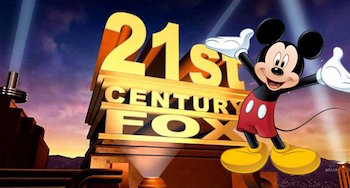OPINION: The Real Question–Why Did Disney Buy Fox?
NORTH AMERICA–While the acquisition of 21st Century Fox's entertainment assets by Disney seems to be both surprising and sudden, in reality it is part of a consolidation trend currently taking place among the traditional global media players in response to the changing media landscape brought on by FANG (Facebook, Amazon, Netflix, Google).
April 6, 2018

The answer lies in the changing media landscape, being driven by SVOD content creators like Netflix and Amazon.
 NORTH AMERICA–While the acquisition of 21st Century Fox’s entertainment assets by Disney seems to be both surprising and sudden, in reality it is part of a consolidation trend currently taking place among the traditional global media players in response to the changing media landscape brought on by FANG (Facebook, Amazon, Netflix, Google).
NORTH AMERICA–While the acquisition of 21st Century Fox’s entertainment assets by Disney seems to be both surprising and sudden, in reality it is part of a consolidation trend currently taking place among the traditional global media players in response to the changing media landscape brought on by FANG (Facebook, Amazon, Netflix, Google).
After just a cursory look at the landscape of media acquisitions of just the past several years, the Disney/Fox deal is simply the latest in what will continue to be the merger and or acquisition of content providers by major distribution companies.
Disney’s acquisition of Fox’s entertainment assets adds to its continued push to maintain its dominance as the King of Content. After all, it joins a significant list of other major Disney acquisitions of the past decade including Pixar Animation, Marvel and Lucasfilm.
The difference with Fox is that it represents a much broader range of programming, some of which simply does not, at first glance, appear to fit into the Disney Universe.
Let’s not forget that Disney sold “Power Rangers” back to its original owner Saban, who had sold it to Fox. Disney divested itself of “Power Rangers” because moms didn’t like the boy-centric, action-packed content that was core to the “Power Rangers” franchise. Of course since that sale in 2010, Disney has indeed had huge success with the generally boy-centric, action-packed Marvel properties and the Star Wars franchise.
The real question is: Why did Disney buy Fox?
The answer lies in layers: Fox controls the movie and TV distribution on Marvel's very successful X-Men and Fantatsic Four franchises. It also had a surprise hit with the R-rated Marvel comic Deadpool, which Disney would never have made, but served to expand the Marvel brand in a new direction.
The Fox acquisition will also add several more very successful film franchises including Ice Age, Planet of the Apes and Avatar, all of which have multi-category potential (i.e. theme parks, stage shows, consumer products, etc.).
Plus, Disney will finally acquire the distribution rights to the first Star Wars movie, which Fox had retained in perpetuity.
We also can’t forget that Disney is also buying Fox’s TV production business, which includes a number of major small screen successes that Disney will need for the ambitious new streaming service it plans to launch in 2019 to compete with Netflix and Amazon.
At the end of the day, if content is indeed King, then Disney has once again, made a very smart conquest.
From the perspective of the global licensing business, what does this mean?
While the naysayers will see it as Disney’s continued march to monopolize the entertainment licensing business, optimists see it as an opportunity to create new licensing juggernauts to move onto the License Global list of Top 150 Global Licensors.
If nature abhors a vacuum, then each time Disney or Universal or Meredith Corp. acquires another major licensor, it makes room for a new, less-established licensor to move onto the list.
As the licensing industry continues to mature into the digital age, tremendous opportunities exist for new brands from the digital world. Certainly, we are seeing this in video gaming, with Activison/Blizzard/King creating an eSports empire, or future leading licensors like Facebook, Amazon, Netflix and Google (FANG).
For those of us who have been in licensing business for a while, the Disney-Fox acquisition is a natural consequence of the upward mobility of the industry and the continually changing, yet ever-growing business of licensing.
You May Also Like






